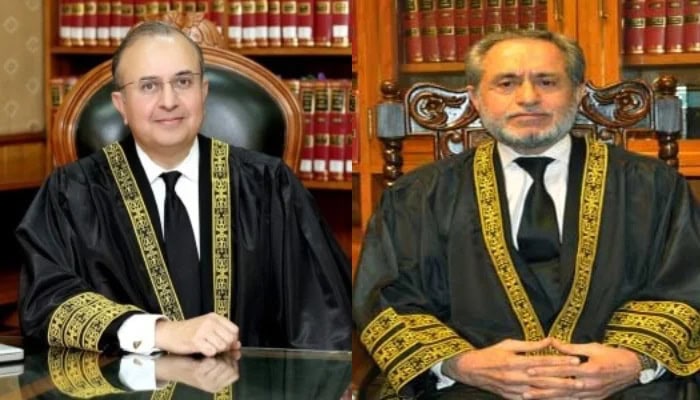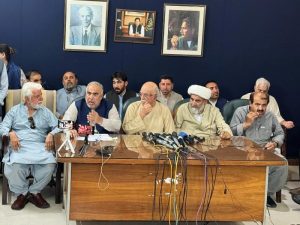ISLAMABAD – Two judges of the Supreme Court of Pakistan have raised objections over discretionary powers of the country’s too judge regarding taking suo moutu notices, calling for revisiting the “power of ‘one man show’ enjoyed by the office of the Chief Justice of Pakistan” in order to ensure public trust on the institution.
Justice Mansoor Ali Shah and Justice Jamal Mandokhel stated this in their joint detailed judgment on the suo motu case and connection constitutional petitions regarding election date for polls in Punjab and Khyber Pakhtunkhwa.
In February, Chief Justice Umar Ata Bandial had taken suo motu notice over delay in elections in both province where assemblies were dissolved by the PTI in January. Originally, a nine-member bench was formed, however Justice Ijazul Ahsan and Justice Mazhar Ali Akbar Naqbi recused themselves from hearing the cases after objections were raised by the PML-N, JUI-F and others.
Later, two judges – Justice Athar Minallah and Justice Yahya – “dismissed the suo motu proceedings as well as the connected constitution petitions, by their orders dated 23.02.2023”.
After several hearings, the remaining five-member bench issued a decision by a vote of 3-2 with Justice Jamal Khan Mandokhail and Justice Mansoor Ali Shah gave a dissenting note, saying the cases are pending in high courts and suo moto notice could not be taken. The top court had directed all stakeholders to hold elections in Punjab and KP within 90 days.
Now, Justice Shah and Justice Mandokhail have issued their 27-page judgment. They said the by the suo motu proceedings and the connected constitution petitions, “this Court has been ushered into a ‘political thicket’, which commenced last year with the dissolution of the National Assembly of Pakistan and reached the dissolution of the Provincial Assemblies of two Provinces this year after passing through the disputes over the matters of counting of votes of defected members of political parties and election to the office of the Chief Minister of a Province, and that too, in the exercise of its original jurisdiction under Article 184(3) of the Constitution”.
“We also find it necessary to narrate the reasons for non-issuance of the Order of the Court in the present case, to make them part of the record. We believed that our decision concurring with the decision of our learned brothers (Yahya Afridi and Athar Minallah, JJ.) in dismissing the present suo motu proceedings and the connected constitution petitions, had become the Order of the Court by a majority of 4-3 while our other three learned brothers held the view that their order was the Order of the Court by a majority of 3-2,” reads the judgment.
Citing a previous ruling of the apex court, the dissenting judge said: “ This court has held in H.R.C. No.14959-K of 2018,37 that “once the bench is constituted, cause list is issued and the bench starts hearing the cases, the matter regarding constitution of the bench goes outside the pale of administrative powers of the Chief Justice and rest on the judicial side, with the bench. Any member of the bench may, however, recuse to hear a case for personal reasons or may not be available to sit on the bench due to prior commitments or due to illness”.
Election Suo Motu by Afreen Mirza
Any effort to muffle disagreement or to silence dissent or to dampen an alternative viewpoint of a member on the bench, would shake the foundations of a free and impartial justice system… a bench, once it is constituted and is seized of a matter on the judicial side, cannot be reconstituted by the Chief Justice in exercise of his administrative powers, unless a member(s) of the bench recuses or for reasons
“Therefore, we are of the opinion that the dismissal of the present suo motu proceedings and the connected constitution petitions is the Order of the Court by a majority of 4 to 3 of the seven-member Bench”.
They also gave reference of the Panama case. “In the said case, the first order of the Court was passed by a 3-2 majority, and in the subsequent hearings conducted in pursuance of the majority judgment the two Hon’ble Judges, who had made and announced their final decision, did not sit on the Bench but they were not considered to have been excluded from the Bench and were made a party to the final judgment passed by the remaining three Hon’ble Judges, and they also sat on the Bench that heard the review petitions,” they wrote.
“Lastly, we find it essential to underline that in order to strengthen our institution and to ensure public trust and public confidence in our Court, it is high time that we revisit the power of “one man show” enjoyed by the office of the Chief Justice of Pakistan.
“This Court cannot be dependent on the solitary decision of one man, the Chief Justice, but must be regulated through a rule-based system approved by all Judges of the Court under Article 191 of the Constitution, in regulating the exercise of its jurisdiction under Article 184(3) including the exercise of suo motu jurisdiction; the constitution of Benches to hear such cases; the constitution of Regular Benches to hear all the other cases instituted in this Court; and the constitution of Special Benches,” reads the judgment.
They said the power of doing a “one-man show” is not only anachronistic, outdated and obsolete but also is antithetical to good governance and incompatible to modern democratic norms.
“One-man show leads to the concentration of power in the hands of one individual, making the system more susceptible to the abuse of power.”
In order to build a strong, open and transparent institution, we have to move towards a rule-based institution. The discretion of the Chief Justice needs to be structured through rules, they said.
“This Court has held that structuring discretion means regularizing it, organizing it and producing order in it, which helps achieve transparency, consistency and equal treatment in decision-making – the hallmarks of the rule of law. The seven instruments that are usually described as useful in the structuring of discretionary power are open plans, open policy statements, open rules, open findings, open reasons, open precedents, and fair procedure. Our jurisprudence must first be applied at home”.
Dismissing the constitution petition and suo motu proceedings, the judges observed that the respective high courts shall decide the matters pending before them within three working days.
“We, therefore, agree with the orders dated 23.02.2023 passed by our learned brothers, Yahya Afridi and Athar Minallah, JJ.49, and dismiss the present constitution petitions and drop the suo motu proceedings,” read the order.
Supreme Court orders holding Punjab, KP elections in 90 days













